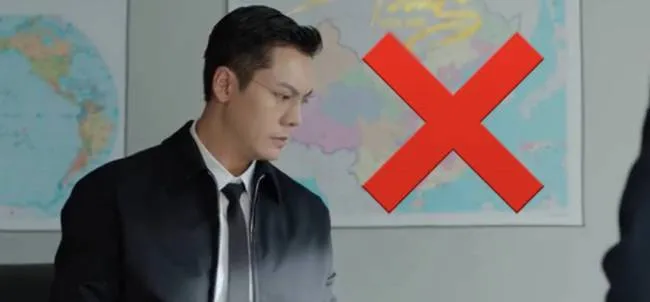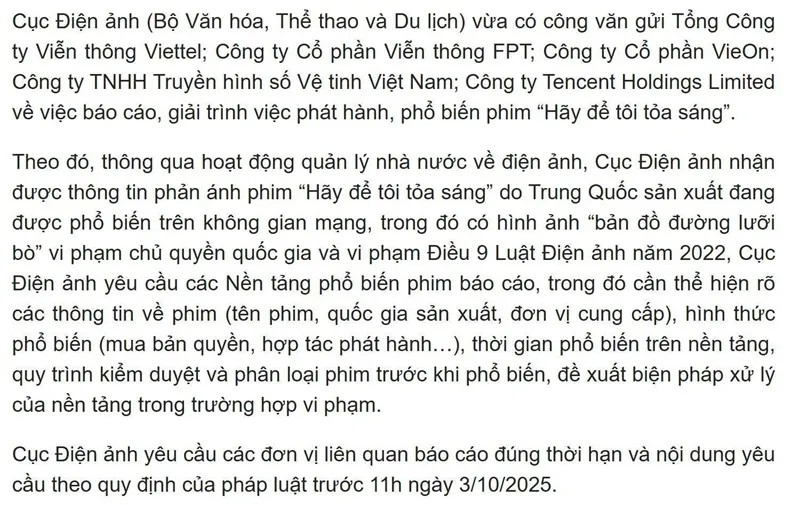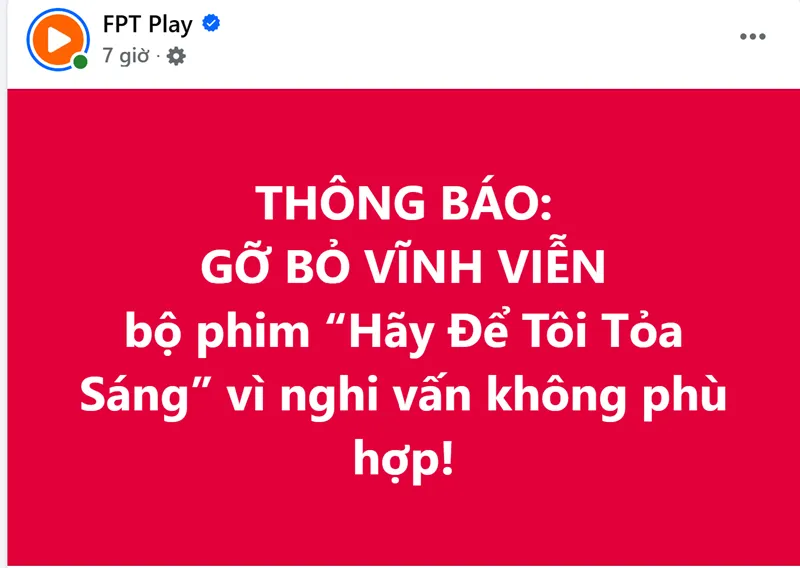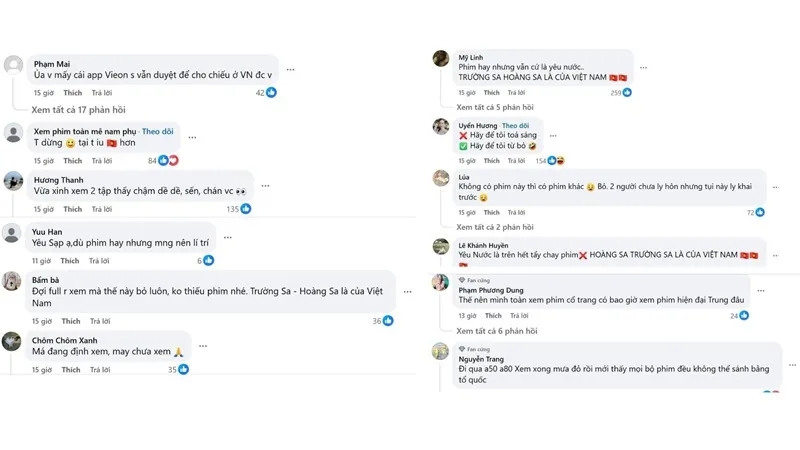(TAP) - Recently, the Chinese film “Let Me Shine” caused great outrage among Vietnamese public opinion when it was discovered to contain an image of the “cow tongue line” map. In response to the above incident, the Ministry of Culture, Sports and Tourism of Vietnam has sent a document requesting the Cinema Department and platforms in Vietnam that released this film to explain, affirming that they will handle the matter in accordance with legal regulations.
“Let Me Shine” is a Chinese television drama adapted from the novel “Da Qiao Xiao Qiao” by author Zhang Yue Ran. The series stars two well-known actors: Zhao Lusi (as Xu Yan) and William Chan (as Shen Haoming). The first episode premiered on September 27 and quickly topped various online streaming charts in China, including WeTV, further elevating Zhao Lusi's prominence in the Chinese entertainment industry. In the drama, she portrays a poor and unfortunate young woman with a strong desire to change her life.

“Let Me Shine” is adapted from the novel Da Qiao Xiao Qiao, featuring actors Zhao Lusi and William Chan. Source: FPT Telecom
In Vietnam, the film has been licensed for broadcast by several platforms, including TV360, VieOn, K+, and FPT Play, and is currently available up to episode 15. According to an official statement issued by the Ministry of Culture, Sports and Tourism (MOCST) on October 3 (Vietnam time), the controversial scene appeared in episode 16, where an image of the “cow tongue line” map was shown. This sparked outrage among Vietnamese audiences, as it was seen as a violation of national sovereignty. In response, the Vietnam Department of Cinema promptly issued a formal request for clarification and reporting from multiple related parties, including Viettel Telecommunications Corporation, FPT Telecom JSC, VieOn JSC, Vietnam Satellite Digital Television Co., Ltd. (K+), and Tencent Holdings Limited, regarding the distribution and broadcasting of the film.

The appearance of the “cow tongue line” image in the film constitutes a violation of Vietnam’s territorial sovereignty, sparking public outrage. Source: Ministry of Culture, Sports and Tourism’s Official Portal
According to the Vietnam Department of Cinema, through its state management activities, the agency received reports regarding the distribution of this Chinese film on digital platforms in Vietnam, which contains imagery of the “cow tongue line”, a serious violation of Article 9 of the 2022 Law on Cinema and an infringement on national territorial sovereignty. The Department has requested that the platforms involved submit detailed reports, including: the film’s title, country of origin, and content provider; the method of distribution (licensed acquisition, co-distribution, etc.); release timeline; content review and classification procedures prior to release; and proposed measures for addressing the violation.

The Department of Cinema has requested that all relevant parties submit their reports in accordance with legal regulations, ensuring both deadline and required content are met, no later than 11:00 AM on October 3, 2025. Source: Official Portal of the Ministry of Culture, Sports and Tourism
The deadline for submitting the report was set for no later than 11:00 AM on October 3, 2025. Deputy Director of the Department of Cinema, Mr. Do Quoc Viet, stated that the Department will proceed with handling the case in accordance with regulations. Based on the inspection results, appropriate and strict measures will be applied. Additionally, the Department will strengthen inspection and supervision efforts to prevent similar incidents from recurring in the future.
Immediately after the violation information spread widely, many major fan pages specializing in Chinese film and showbiz news in Vietnam stopped sharing content related to the film. Notably, on the morning of October 3, “Let Me Shine” was removed from several platforms, including FPT Play. On the same day, an official representative from FPT posted a statement on the FPT Play Facebook page, confirming the permanent removal of the entire series from their system, even though episode 16 had not yet aired. In the announcement, FPT emphasized: “We always prioritize compliance with Vietnamese law and respect for national sovereignty. We are committed to ensuring strict content censorship, providing audiences with safe, lawful, and meaningful entertainment experiences”.

The streaming platform FPT Play confirmed the permanent removal of the entire film series from its system. Source: FPT Play Facebook page
The incorporation of the “cow tongue line” by China into cultural products such as films, games, and maps is not new. Previously, several similar works were banned or penalized in Vietnam. Specifically, in December 2019, the Ministry of Culture, Sports and Tourism fined CJ CGV Vietnam Co., Ltd. 170 million VND for importing the animated film “Everest - The Little Yeti”, which contained images of the cow tongue line. In July 2020, the American-produced film “Barbie” was banned from screening in Vietnam due to similar content. At the same time, the Vietnam Department of Cinema requested Netflix and FPT Play to remove the Chinese film “Flight to You” because the illegal map image appeared throughout nine episodes. Most recently, in March 2022, the action film “Uncharted”, starring Tom Holland, was also banned from release in Vietnam after the National Film Appraisal and Classification Council detected the presence of the cow tongue line element.

The film Everest - The Little Yeti was destroyed in Vietnam. Source: Official Portal of the Ministry of Culture, Sports and Tourism

“Uncharted” faced a similar fate. Source: Official Portal of the Ministry of Culture, Sports and Tourism
In light of this situation, Vietnamese audiences have strongly supported the firm actions taken by regulatory authorities and film distribution platforms. On fan pages and streaming platforms, many users voiced their condemnation of content that infringes on national sovereignty, emphasizing that patriotism and sovereignty are non-negotiable. Comments such as, “There are many films, but there is only one country,” reflect this strong sentiment.
Many users have spoken out condemning the insertion of content that violates national sovereignty and affirming the spirit of patriotism. Screenshot included.
Vu Ha
